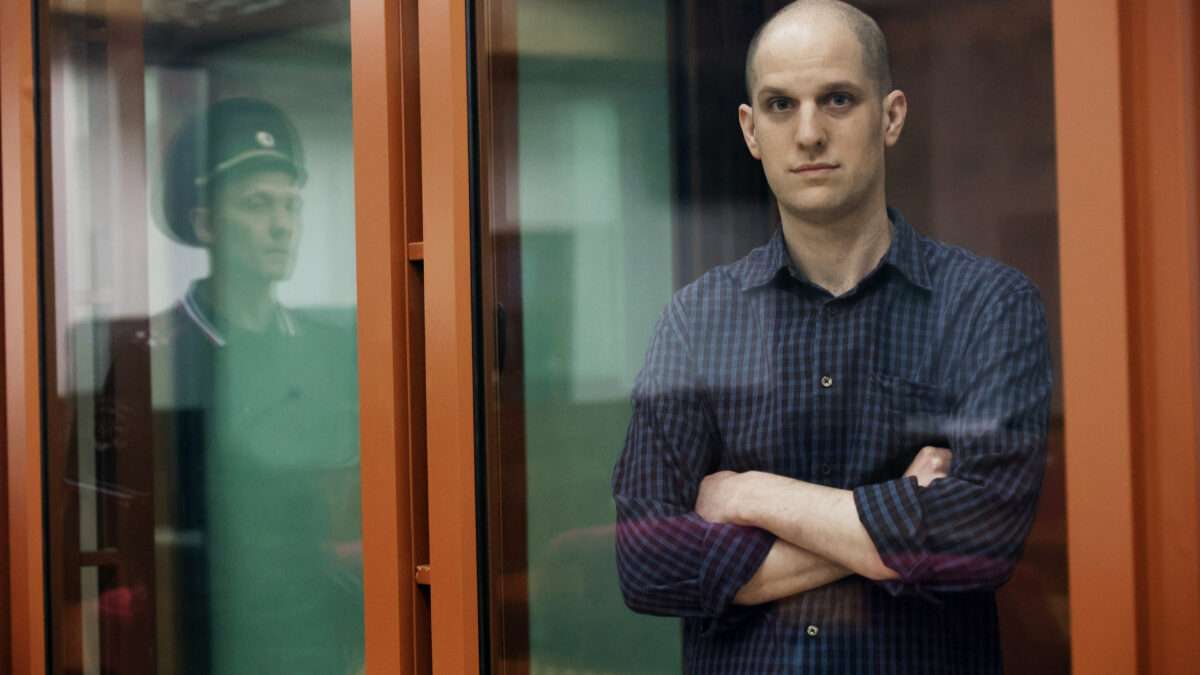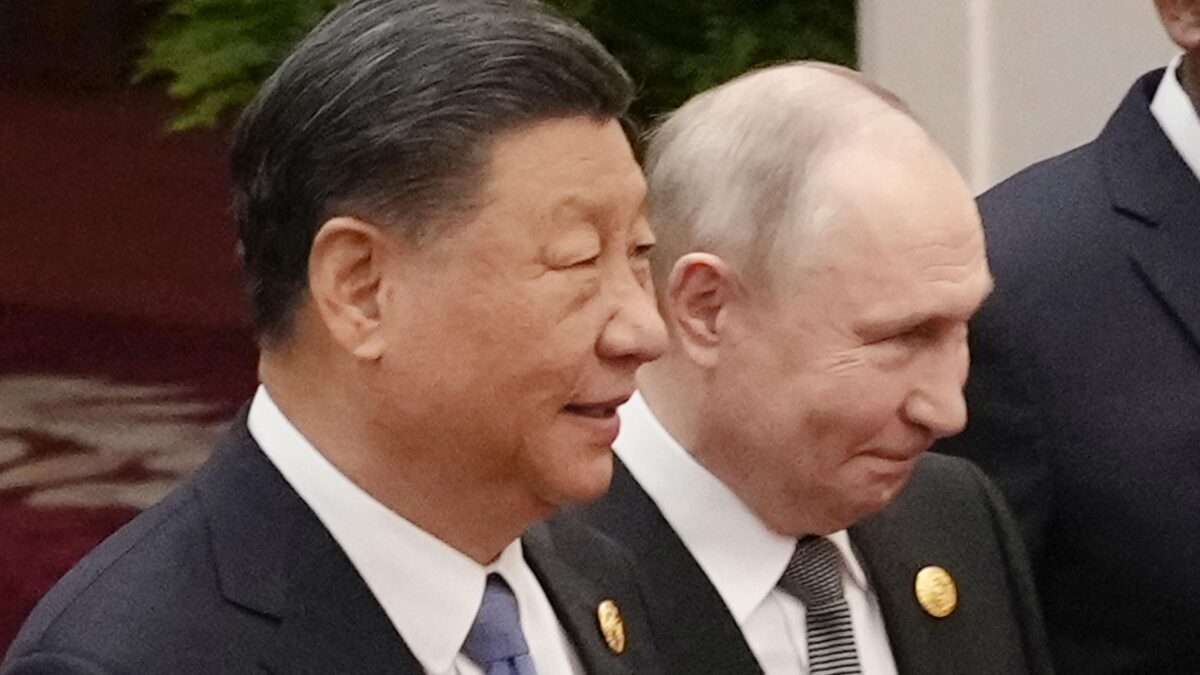Why is Intel’s GPU program having problems?
What is going on with Intel's GPU program? The chatter is negative but what is really happening?
Read more ▶
The post Why is Intel’s GPU program having problems? appeared first on SemiAccurate.
What is going on with Intel's GPU program? The chatter is negative but what is really happening?
Read more ▶
The post Why is Intel’s GPU program having problems? appeared first on SemiAccurate.


Wall Street Journal reporter Evan Gershkovich was released from Russian captivity on Thursday as part of the largest prisoner swap between Russia and Western nations in decades. Gershkovich had been imprisoned for nearly 500 days and was recently sentenced to 16 years in a penal colony.
Gershkovich was arrested in March 2023 while on assignment in Yekaterinburg, Russia. Russian authorities claimed he was obtaining information for the CIA, though the allegations against Gershkovich are widely assumed to be false and have been denied strenuously by the Journal.
Gershkovich was released around 11:20 a.m. Eastern time at an airport in Ankara, Turkey. Several other prisoners were also released, including Russia-critical journalists Alsu Kurmasheva and Vladimir Kara-Murza, and American former Marine Paul Whelan, who had been imprisoned since 2018. Russian hit man Vadim Krasikov, who was imprisoned in Germany after receiving a life sentence for killing a Chechen rebel, was released back to Russia as part of the deal.
In total, the swap involved two dozen prisoners from at least six countries, according to The Wall Street Journal.
"The exchange is emblematic of a new era of state-sponsored hostage-taking by autocratic governments seeking leverage over rivals. It was negotiated as tensions soared between Russia and the West over the war in Ukraine," the Journal reported on Thursday. "It also offers sobering evidence of the asymmetry between the U.S. and Russia in this new, piratical order. [Russian President Vladimir] Putin can order foreigners plucked from restaurants and hotels and given lengthy prison sentences on spurious charges—something an American leader can't do."
While this is the largest prisoner swap the U.S. has engaged in in recent years to free citizens imprisoned in Russia, it isn't its first. In December 2022, WNBA player Brittney Griner was released in a swap for notorious Russian arms dealer Viktor Bout after being held for almost nine months on drug charges. While securing the release of Griner, Gershkovich, and other American citizens from wrongful Russian captivity is vital, it may also work to incentivize Russian authorities to continue jailing Americans on false charges.
"The deal that secured their freedom was a feat of diplomacy," President Joe Biden said shortly after Thursday's prisoner swap. "Some of these women and men have been unjustly held for years. All have endured unimaginable suffering and uncertainty. Today, their agony is over….I will not stop working until every American wrongfully detained or held hostage around the world is reunited with their family."
The post <i>Wall Street Journal</i> Reporter Evan Gershkovich Released From Russian Captivity appeared first on Reason.com.



Robert F. Kennedy Jr. won applause at the Libertarian National Convention by criticizing government lockdowns and deficit spending, and saying America shouldn't police the world.
It made me want to interview him. This month, I did.
He said intelligent things about America's growing debt:
"President Trump said that he was going to balance the budget and instead he (increased the debt more) than every president in United States history—$8 trillion. President Biden is on track now to beat him."
It's good to hear a candidate actually talk about our debt.
"When the debt is this large…you have to cut dramatically, and I'm going to do that," he says.
But looking at his campaign promises, I don't see it.
He promises "affordable" housing via a federal program backing 3 percent mortgages.
"Imagine that you had a rich uncle who was willing to cosign your mortgage!" gushes his campaign ad. "I'm going to make Uncle Sam that rich uncle!"
I point out that such giveaways won't reduce our debt.
"That's not a giveaway," Kennedy replies. "Every dollar that I spend as president is going to go toward building our economy."
That's big government nonsense, like his other claim: "Every million dollars we spend on child care creates 22 jobs!"
Give me a break.
When I pressed him about specific cuts, Kennedy says, "I'll cut the military in half…cut it to about $500 billion….We are not the policemen of the world."
"Stop giving any money to Ukraine?" I ask.
"Negotiate a peace," Kennedy replies. "Biden has never talked to Putin about this, and it's criminal."
He never answered whether he'd give money to Ukraine. He did answer about Israel.
"Yes, of course we should,"
"[Since] you don't want to cut this spending, what would you cut?"
"Israel spending is rather minor," he responds. "I'm going to pick the most wasteful programs, put them all in one bill, and send them to Congress with an up and down vote."
Of course, Congress would just vote it down.
Kennedy's proposed cuts would hardly slow down our path to bankruptcy. Especially since he also wants new spending that activists pretend will reduce climate change.
At a concert years ago, he smeared "crisis" skeptics like me, who believe we can adjust to climate change, screaming at the audience, "Next time you see John Stossel and [others]… these flat-earthers, these corporate toadies—lying to you. This is treason, and we need to start treating them now as traitors!"
Now, sitting with him, I ask, "You want to have me executed for treason?"
"That statement," he replies, "it's not a statement that I would make today….Climate is existential. I think it's human-caused climate change. But I don't insist other people believe that. I'm arguing for free markets and then the lowest cost providers should prevail in the marketplace….We should end all subsidies and let the market dictate."
That sounds good: "Let the market dictate."
But wait, Kennedy makes money from solar farms backed by government guaranteed loans. He "leaned on his contacts in the Obama administration to secure a $1.6 billion loan guarantee," wrote The New York Times.
"Why should you get a government subsidy?" I ask.
"If you're creating a new industry," he replies, "you're competing with the Chinese. You want the United States to own pieces of that industry."
I suppose that means his government would subsidize every industry leftists like.
Yet when a wind farm company proposed building one near his family's home, he opposed it.
"Seems hypocritical," I say.
"We're exterminating the right whale in the North Atlantic through these wind farms!" he replies.
I think he was more honest years ago, when he complained that "turbines…would be seen from Cape Cod, Martha's Vineyard… Nantucket….[They] will steal the stars and nighttime views."
Kennedy was once a Democrat, but now Democrats sue to keep him off ballots. Former Clinton Labor Secretary Robert Reich calls him a "dangerous nutcase."
Kennedy complains that Reich won't debate him.
"Nobody will," he says. "They won't have me on any of their networks."
Well, obviously, I will.
I especially wanted to confront him about vaccines.
In a future column, Stossel TV will post more from our hourlong discussion.
COPYRIGHT 2024 BY JFS PRODUCTIONS INC.
The post RFK Jr. Pays Lip Service to the Debt While Pushing Policies That Would Increase It appeared first on Reason.com.



Enlarge (credit: Getty Images)
As part of today’s blockbuster prisoner swap between the US and Russia, which freed the journalist Evan Gershkovich and several Russian opposition figures, Russia received in return a motley collection of serious criminals, including an assassin who had executed an enemy of the Russian state in the middle of Berlin.
But the Russians also got two hackers, Vladislav Klyushin and Roman Seleznev, each of whom had been convicted of major financial crimes in the US. The US government said that Klyushin “stands convicted of the most significant hacking and trading scheme in American history, and one of the largest insider trading schemes ever prosecuted.” As for Seleznev, federal prosecutors said that he has “harmed more victims and caused more financial loss than perhaps any other defendant that has appeared before the court.”
What sort of hacker do you have to be to attract the interest of the Russian state in prisoner swaps like these? Clearly, it helps to have hacked widely and caused major damage to Russia’s enemies. By bringing these two men home, Russian leadership is sending a clear message to domestic hackers: We’ve got your back.


Enlarge / OpenAI said it was committed to uncovering disinformation campaigns and was building its own AI-powered tools to make detection and analysis "more effective." (credit: FT montage/NurPhoto via Getty Images)
OpenAI has revealed operations linked to Russia, China, Iran and Israel have been using its artificial intelligence tools to create and spread disinformation, as technology becomes a powerful weapon in information warfare in an election-heavy year.
The San Francisco-based maker of the ChatGPT chatbot said in a report on Thursday that five covert influence operations had used its AI models to generate text and images at a high volume, with fewer language errors than previously, as well as to generate comments or replies to their own posts. OpenAI’s policies prohibit the use of its models to deceive or mislead others.
The content focused on issues “including Russia’s invasion of Ukraine, the conflict in Gaza, the Indian elections, politics in Europe and the United States, and criticisms of the Chinese government by Chinese dissidents and foreign governments,” OpenAI said in the report.


Enlarge / A sea-borne variant of the commercial Ceres 1 rocket lifts off near the coast of Rizhao, a city of 3 million in China's Shandong province. (credit: VCG via Getty Images)
Welcome to Edition 6.46 of the Rocket Report! It looks like we will be covering the crew test flight of Boeing's Starliner spacecraft and the fourth test flight of SpaceX's giant Starship rocket over the next week. All of this is happening as SpaceX keeps up its cadence of flying multiple Starlink missions per week. The real stars are the Ars copy editors helping make sure our stories don't use the wrong names.
As always, we welcome reader submissions, and if you don't want to miss an issue, please subscribe using the box below (the form will not appear on AMP-enabled versions of the site). Each report will include information on small-, medium-, and heavy-lift rockets as well as a quick look ahead at the next three launches on the calendar.
Another North Korean launch failure. North Korea's latest attempt to launch a rocket with a military reconnaissance satellite ended in failure due to the midair explosion of the rocket during the first-stage flight this week, South Korea's Yonhap News Agency reports. Video captured by the Japanese news organization NHK appears to show the North Korean rocket disappearing in a fireball shortly after liftoff Monday night from a launch pad on the country's northwest coast. North Korean officials acknowledged the launch failure and said the rocket was carrying a small reconnaissance satellite named Malligyong-1-1.


Britain's signals intelligence spy chief raised eyebrows this week with warnings that Russia is coordinating both cyberattacks and physical acts of sabotage against the West. There's evidence to back her claims—and the West may be returning the favor. Coming soon after FBI Director Christopher Wray warned that China is targeting American infrastructure, it looks like the world is not only fracturing once again, but that the hostile blocs are engaged in covert warfare.
"We are increasingly concerned about growing links between the Russian intelligence services and proxy groups to conduct cyberattacks as well as suspected physical surveillance and sabotage operations," Government Communications Headquarters (GCHQ) Director Anne Keast-Butler told an audience at the United Kingdom government-sponsored CyberUK 2024 conference. "Before, Russia simply created the right environments for these groups to operate, but now they are nurturing and inspiring these non-state cyber actors in some cases seemingly coordinating physical attacks against the West."
Keast-Butler, whose agency is comparable to the U.S. National Security Agency (NSA), also called out China, Iran, and North Korea as cybersecurity dangers. But naming Russian officials as being behind "physical attacks" raises the stakes. Sadly, her claims are well-founded.
"A 20-year-old British man has been charged with masterminding an arson plot against a Ukrainian-linked target in London for the benefit of the Russian state," CBS News reported last month. That wasn't an isolated incident.
"In April alone a clutch of alleged pro-Russian saboteurs were detained across the continent," The Economist noted May 12 in describing what it called a "shadow war" between East and West. "Germany arrested two German-Russian dual nationals on suspicion of plotting attacks on American military facilities and other targets on behalf of the GRU, Russia's military intelligence agency. Poland arrested a man who was preparing to pass the GRU information on Rzeszow airport, the most important hub for military aid to Ukraine. Britain charged several men over an earlier arson attack in March on a Ukrainian-owned logistics firm in London whose Spanish depot was also targeted."
The GCHQ chief's warnings coupled with reality on the ground are alarming in themselves. Worse, they come after FBI Director Christopher Wray issued similar cautions in April about China.
"The PRC [People's Republic of China] has made it clear that it considers every sector that makes our society run as fair game in its bid to dominate on the world stage, and that its plan is to land low blows against civilian infrastructure to try to induce panic and break America's will to resist," Wray told the Vanderbilt Summit on Modern Conflict and Emerging Threats in Nashville, Tennessee.
Wray clarified that, by "infrastructure," he meant "everything from water treatment facilities and energy grids to transportation and information technology."
If that doesn't make you want to check that your pantry is stocked and that the water filter and generator are in working order, nothing will.
Of course, in war of any sort, the implication is that both sides are involved in conflict. Western intelligence officials are loud in their warnings about foreign threats, but less open regarding just what their own operatives might be doing in Russia, China, and elsewhere. Still, there's evidence that this is hardly a one-sided war, shadowy though it may be.
In June 2022, The New York Times reported that Ukraine's defensive efforts relied heavily on "a stealthy network of commandos and spies rushing to provide weapons, intelligence and training." In addition to Americans, the story noted, "commandos from other NATO countries, including Britain, France, Canada and Lithuania, also have been working inside Ukraine."
American journalist and combat veteran Jack Murphy goes further, claiming the CIA, working through an allied spy service "is responsible for many of the unexplained explosions and other mishaps that have befallen the Russian military industrial complex." The targets include "railway bridges, fuel depots and power plants," he adds.
And if you wonder who blew up Nord Stream 1 and 2, well, so do a lot of people. Russia was initially accused, but it didn't make a lot of sense for the country's forces to destroy pipelines that generated revenue and fed western dependence on Russian natural gas. Since then, Denmark and Sweden have closed inconclusive investigations, journalist Seymour Hersh blamed American officials, and a report by Der Spiegel and The Washington Post placed responsibility on a rogue Ukrainian military officer.
Taken all together, the warnings from Keast-Butler and Wray, as well as acts of sabotage and arrests of foreign agents suggest that fears of a wider war resulting from Russia's continuing invasion of Ukraine may miss the point; the war could already be here. People looking for tanks and troops are overlooking cyber intrusions, arson, bombings, and other low-level mayhem.
"Russia is definitely at war with the West," Oleksandr Danylyuk of the Royal United Services Institute, a British defense and security think tank, told NBC News earlier this week.
Russian officials seem to embrace that understanding, with Kremlin spokesman Dmitry Peskov commenting in March that the invasion of Ukraine, originally referred to by the euphemism "special military operation," is now more serious. "It has become a war for us as the collective West more and more directly increases its level of involvement in the conflict," he said.
Fortunately, a shadow war of the sort around us is less destructive than open military conflict, especially when the hostilities involve nuclear-armed powers. It's far better that spies hack the email accounts of government officials, as happened in the case of a Russian cyberattack on Germany's ruling Social Democrats, than that cities burn. But civilians still must live with the consequences of combatants attempting to do each other harm—particularly when the harm is to infrastructure on which regular people rely.
So, welcome to the world of global shadow war. Try to not become collateral damage.
The post World War War III May Already Have Started—in the Shadows appeared first on Reason.com.



Just and democratic! "We are working in solidarity on the formulation of a more just and democratic multipolar world order," said Russian President Vladimir Putin of his partnership with Chinese President Xi Jinping, lying through his teeth as he arrived in Beijing for diplomatic talks.
This month, Putin was inaugurated for yet another term as president. That he chose China as his first state visit of this term, and traveled with such a massive delegation, is of some significance—as well as the fact that the visit came on the heels of U.S. Secretary of State Antony Blinken's China visit last month, in which he raised concerns over Xi's enabling of Putin's war in Ukraine.
During the meetings, Putin hyped how China is Russia's top trade partner, as well as their future collaborations "in energy and nuclear power research," per The New York Times, though he neglected "mention of a proposed natural gas pipeline to China that Moscow would like to see built."
A joint statement that emerged from the visit "spoke of concerns about what were described as U.S. efforts to violate the strategic nuclear balance, about global U.S. missile defence that threatened Russia and China, and about U.S. plans for high precision non-nuclear weapons," reported Reuters.
Putin, whose military is currently assaulting the Ukrainian city of Kharkiv from above, needs to curry even more favor with Xi to win the war he started in Ukraine and ensure he can rely on Chinese help. (Ukraine, meanwhile, is awaiting more weapons shipments from the U.S., which have been substantially delayed.)
China "claims to take a neutral position in the conflict, but it has backed Moscow's contentions that Russia was provoked into attacking Ukraine by the West, and continues to supply Russia with key components that Moscow needs for its productions of weapons," reported the Associated Press.
Last year, China proposed a deal for peace, which left massive parts of Ukraine to Putin and was understandably rejected by Ukraine and pretty much all of the West. It's in China's best interest for the war to end—Russia's invasion "jolted the Chinese economy by pushing up oil, wheat and other commodity prices," and Xi has not been thrilled by the heightened threat of nuclear war—but it has played a quite unserious role in actually bringing that about.
During this visit, Putin traveled with a huge delegation that was supposed to signal all the areas of overlap and cooperation between Russia and China. In the delegation, reported the Times, was "Alexander Novak, an official overseeing oil and gas, including the development of the Power of Siberia 2 natural gas pipeline." The project would "redirect Russian gas supplies that had gone to Europe toward China instead," but Xi and Putin have not yet publicly reached a deal to make it so.
Scenes from New York: "An NYPD officer who was guarding Mayor Eric Adams' home in Brooklyn in 2022 unjustifiably shot a man who was entering his own apartment building, according to a federal lawsuit filed on Wednesday," reported Gothamist.
Apparently cops who were guarding Adams' house also arrested Tiffanie Narinesammy, a pregnant woman who lived inside the house where this all transpired. Narinesammy alleges in the suit that her rights were violated, as she was held in custody for 24 hours; she delivered a stillborn baby six weeks later, which the suit connects to the stress of the encounter.
Gays: Going to Pride

FBI: What if a terrorist k*lls you?
Gays: Is someone planning to do that?
FBI: Not that we know of but hypothetically it could happen.
???? pic.twitter.com/JGY3tor92m— River Page (@river_is_nice) May 15, 2024
The post Tyrant Besties appeared first on Reason.com.

Ctrl-Alt-Speech is a weekly podcast about the latest news in online speech, from Mike Masnick and Everything in Moderation‘s Ben Whitelaw.
Subscribe now on Apple Podcasts, Overcast, Spotify, Pocket Casts, YouTube, or your podcast app of choice — or go straight to the RSS feed.
In this week’s round-up of the latest news in online speech, content moderation and internet regulation, Mike and Ben cover:
This episode is brought to you with financial support from the Future of Online Trust & Safety Fund.

Video shows an out-of-control blue city bus in the middle of St. Petersburg plowing into a car before careening off a bridge, carrying at least 20 passengers on board. The bus then immediately sinks into the Moika River. (See video below, posted by The Moscow Times.) — Read the rest
The post City bus carrying 20 passengers in St. Petersburg bizarrely veers and drives straight into river (video) appeared first on Boing Boing.
Ctrl-Alt-Speech is a weekly podcast about the latest news in online speech, from Mike Masnick and Everything in Moderation‘s Ben Whitelaw.
Subscribe now on Apple Podcasts, Overcast, Spotify, Pocket Casts, YouTube, or your podcast app of choice — or go straight to the RSS feed.
In this week’s round-up of the latest news in online speech, content moderation and internet regulation, Mike and Ben cover:
This episode is brought to you with financial support from the Future of Online Trust & Safety Fund.

Video shows an out-of-control blue city bus in the middle of St. Petersburg plowing into a car before careening off a bridge, carrying at least 20 passengers on board. The bus then immediately sinks into the Moika River. (See video below, posted by The Moscow Times.) — Read the rest
The post City bus carrying 20 passengers in St. Petersburg bizarrely veers and drives straight into river (video) appeared first on Boing Boing.
Ctrl-Alt-Speech is a weekly podcast about the latest news in online speech, from Mike Masnick and Everything in Moderation‘s Ben Whitelaw.
Subscribe now on Apple Podcasts, Overcast, Spotify, Pocket Casts, YouTube, or your podcast app of choice — or go straight to the RSS feed.
In this week’s round-up of the latest news in online speech, content moderation and internet regulation, Mike and Ben cover:
This episode is brought to you with financial support from the Future of Online Trust & Safety Fund.

Samsung and Synopsys collaborated on the first production tapeout of a high-performance mobile SoC design, including CPUs and GPUs, using the Synopsys.ai EDA suite on Samsung Foundry’s gate-all-around (GAA) process. Samsung plans to begin mass production of 2nm process GAA chips in 2025, reports BusinessKorea.
UMC developed the first radio frequency silicon on insulator (RF-SOI)-based 3D IC process for chips used in smartphones and other 5G/6G mobile devices. The process uses wafer-to-wafer bonding technology to address radio frequency interference between stacked dies and reduces die size by 45%.
![]()
Fig. 1: UMC’s 3D IC solution for RFSOI technology. Source: UMC
The first programmable chip capable of shaping, splitting, and steering beams of light is now being produced by Skywater Technology and Lumotive. The technology is critical for advancing lidar-based systems used in robotics, automotive, and other 3D sensing applications.
Driven by demand for AI chips, SK hynix revealed it has already booked its entire production of high-bandwidth memory chips for 2024 and is nearly sold out of its production capacity for 2025, reported the Korea Times, while SEMI reported that silicon wafer shipments declined in Q1 2024, quarter over quarter, a 13% drop, attributed to continued weakness in IC fab utilization and inventory adjustments.
PCI-SIG published the CopprLink Internal and External Cable specifications to provide PCIe 5.0 and 6.0 signaling at 32 and 64 GT/s and leverage standard connector form factors for applications including storage, data centers, AI/ML, and disaggregated memory.
The U.S. Department of Commerce (DoC) launched the CHIPS Women in Construction Framework to boost the participation of women and economically disadvantaged people in the workforce, aiming to support on-time and successful completion of CHIPS Act-funded projects. Intel and Micron adopted the framework.
Quick links to more news:
Market Reports
Global
In-Depth
Education and Training
Security
Product News
Quantum
Research
Events
Further Reading
The SiC wafer processing equipment market is growing rapidly, reports Yole. SiC devices will exceed $10B by 2029 at a CAGR of 25%, and the SiC manufacturing tool market is projected to reach $5B by 2026.
imec.xpand launched a €300 million (~$321 million) fund that will invest in semiconductor and nanotechnology startups with the potential to push semiconductor innovation beyond traditional applications and drive next-gen technologies.
Blaize raised $106 million for its programmable graph streaming processor architecture suite and low-code/no-code software platform for edge AI.
Guerrilla RF completed the acquisition of Gallium Semiconductor‘s portfolio of GaN power amplifiers and front-end modules.
About 90% of connected cars sold in 2030 will have embedded 5G capability, reported Counterpoint. Also, about 75% of laptop PCs sold in 2027 will be AI laptop PCs with advanced generative AI, and the global high-level OS (HLOS) or advanced smartwatch market is predicted to grow 15% in 2024.
Powerchip Semiconductor opened a new 300mm facility in northwestern Taiwan targeting the production of AI semiconductors. The facility is expected to produce 50,000 wafers per month at 55, 40, and 28nm nodes.
Taiwan-based KYEC Semiconductor will withdraw its China operations by the third quarter due to increasing geopolitical tensions, reports the South China Morning Post.
Japan will expand its semiconductor export restrictions to China related to four technologies: Scanning electron microscopes, CMOS, FD-SOI, and the outputs of quantum computers, according to TrendForce.
IBM will invest CAD$187 million (~US$137M in Canada’s semiconductor industry, with the bulk of the investment focused on advanced assembly, testing, and packaging operations.
Microsoft will invest US$2.2 billion over the next four years to build Malaysia’s digital infrastructure, create AI skilling opportunities, establish an AI Center of Excellence, and enhance cybersecurity.
New stories and tech talks published by Semiconductor Engineering this week:
Infineon collaborated with ETAS to integrate the ESCRYPT CycurHSM 3.x automotive security software stack into its next-gen AURIX MCUs to optimize security, performance, and functionality.
Synopsys released Polaris Assist, an AI-powered application security assistant on its Polaris Software Integrity Platform, combining LLM technology with application security knowledge and intelligence.
In security research:
U.S. President Biden signed a National Security Memorandum to enhance the resilience of critical infrastructure, and the White House announced key actions taken since Biden’s AI Executive Order, including measures to mitigate risk.
CISA and partners published a fact sheet on pro-Russia hacktivists who seek to compromise industrial control systems and small-scale operational technology systems in North American and European critical infrastructure sectors. CISA issued other alerts including two Microsoft vulnerabilities.
The U.S. National Institute for Innovation and Technology (NIIT) and the Department of Labor (DoL) partnered to celebrate the inaugural Youth Apprenticeship Week on May 5 to 11, highlighting opportunities in critical industries such as semiconductors and advanced manufacturing.
SUNY Poly received an additional $4 million from New York State for its Semiconductor Processing to Packaging Research, Education, and Training Center.
The University of Pennsylvania launched an online Master of Science in Engineering in AI degree.
The American University of Armenia celebrated its 10-year collaboration with Siemens, which provides AUA’s Engineering Research Center with annual research grants.
Renesas and SEGGER Embedded Studio launched integrated code generator support for its 32-bit RISC-V MCU.
Rambus introduced a family of DDR5 server Power Management ICs (PMICs), including an extreme current device for high-performance applications.
![]()
Fig. 2: Rambus’ server PMIC on DDR5 RDIMM. Source: Rambus
Keysight added capabilities to Inspector, part of the company’s recently acquired device security research and test lab Riscure, that are designed to test the robustness of post-quantum cryptography (PQC) and help device and chip vendors identify and fix hardware vulnerabilities. Keysight also validated new conformance test cases for narrowband IoT non-terrestrial networks standards.
Ansys’ RedHawk-SC and Totem power integrity platforms were certified for TSMC‘s N2 nanosheet-based process technology, while its RaptorX solution for on-chip electromagnetic modeling was certified for TSMC’s N5 process.
Netherlands-based athleisure brand PREMIUM INC selected CLEVR to implement Siemens’ Mendix Digital Lifecycle Management for Fashion & Retail solution.
Micron will begin shipping high-capacity DRAM for AI data centers.
Microchip uncorked radiation-tolerant SoC FPGAs for space applications that uses a real-time Linux-capable RISC-V-based microprocessor subsystem.
University of Chicago researchers developed a system to boost the efficiency of quantum error correction using a framework based on quantum low-density party-check (qLDPC) codes and new hardware involving reconfigurable atom arrays.
PsiQuantum will receive AUD $940 million (~$620 million) in equity, grants, and loans from the Australian and Queensland governments to deploy a utility-scale quantum computer in the regime of 1 million physical qubits in Brisbane, Australia.
Japan-based RIKEN will co-locate IBM’s Quantum System Two with its Fugaku supercomputer for integrated quantum-classical workflows in a heterogeneous quantum-HPC hybrid computing environment. Fugaku is currently one of the world’s most powerful supercomputers.
QuEra Computing was awarded a ¥6.5 billion (~$41 million) contract by Japan’s National Institute of Advanced Industrial Science and Technology (AIST) to deliver a gate-based neutral-atom quantum computer alongside AIST’s ABCI-Q supercomputer as part of a quantum-classical computing platform.
Novo Holdings, the controlling stakeholder of pharmaceutical company Novo Nordisk, plans to boost the quantum technology startup ecosystem in Denmark with DKK 1.4 billion (~$201 million) in investments.
The University of Sydney received AUD $18.4 million (~$12 million) from the Australian government to help grow the quantum industry and ecosystem.
The European Commission plans to spend €112 million (~$120 million) to support AI and quantum research and innovation.
Intel researchers developed a 300-millimeter cryogenic probing process to collect high-volume data on the performance of silicon spin qubit devices across whole wafers using CMOS manufacturing techniques.
EPFL researchers used a form of ML called deep reinforcement learning (DRL) to train a four-legged robot to avoid falls by switching between walking, trotting, and pronking.=
The University of Cambridge researchers developed tiny, flexible nerve cuff devices that can wrap around individual nerve fibers without damaging them, useful to treat a range of neurological disorders.
Argonne National Laboratory and Toyota are exploring a direct recycling approach that carefully extracts components from spent batteries. Argonne is also working with Talon Metals on a process that could increase the number of EV batteries produced from mined nickel ore.
Find upcoming chip industry events here, including:
| Event | Date | Location |
|---|---|---|
| IEEE International Symposium on Hardware Oriented Security and Trust (HOST) | May 6 – 9 | Washington DC |
| MRS Spring Meeting & Exhibit | May 7 – 9 | Virtual |
| ASMC: Advanced Semiconductor Manufacturing Conference | May 13 – 16 | Albany, NY |
| ISES Taiwan 2024: International Semiconductor Executive Summit | May 14 – 15 | New Taipei City |
| Ansys Simulation World 2024 | May 14 – 16 | Online |
| NI Connect Austin 2024 | May 20 – 22 | Austin, Texas |
| ITF World 2024 (imec) | May 21 – 22 | Antwerp, Belgium |
| Embedded Vision Summit | May 21 – 23 | Santa Clara, CA |
| ASIP Virtual Seminar 2024 | May 22 | Online |
| Electronic Components and Technology Conference (ECTC) 2024 | May 28 – 31 | Denver, Colorado |
| Hardwear.io Security Trainings and Conference USA 2024 | May 28 – Jun 1 | Santa Clara, CA |
| Find All Upcoming Events Here | ||
Upcoming webinars are here.
Read the latest special reports and top stories, or check out the latest newsletters:
Systems and Design
Low Power-High Performance
Test, Measurement and Analytics
Manufacturing, Packaging and Materials
Automotive, Security and Pervasive Computing
The post Chip Industry Week In Review appeared first on Semiconductor Engineering.



NOTE: This post largely reprints last year's Victims of Communism Day post, with some modifications.
Today is May Day. Since 2007, I have advocated using this date as an international Victims of Communism Day. I outlined the rationale for this proposal (which was not my original idea) in my very first post on the subject:
May Day began as a holiday for socialists and labor union activists, not just communists. But over time, the date was taken over by the Soviet Union and other communist regimes and used as a propaganda tool to prop up their [authority]. I suggest that we instead use it as a day to commemorate those regimes' millions of victims. The authoritative Black Book of Communism estimates the total at 80 to 100 million dead, greater than that caused by all other twentieth century tyrannies combined. We appropriately have a Holocaust Memorial Day. It is equally appropriate to commemorate the victims of the twentieth century's other great totalitarian tyranny. And May Day is the most fitting day to do so….
Our comparative neglect of communist crimes has serious costs. Victims of Communism Day can serve the dual purpose of appropriately commemorating the millions of victims, and diminishing the likelihood that such atrocities will recur. Just as Holocaust Memorial Day and other similar events promote awareness of the dangers of racism, anti-Semitism, and radical nationalism, so Victims of Communism Day can increase awareness of the dangers of left-wing forms of totalitarianism, and government domination of the economy and civil society.
While communism is most closely associated with Russia, where the first communist regime was established, it had comparably horrendous effects in other nations around the world. The highest death toll for a communist regime was not in Russia, but in China. Mao Zedong's Great Leap Forward was likely the biggest episode of mass murder in the entire history of the world.
November 7, 2017 was the 100th anniversary of the Bolshevik seizure of power in Russia, which led to the establishment of the first-ever communist regime. On that day, I put up a post outlining some of the lessons to be learned from a century of experience with communism. The post explains why the lion's share of the horrors perpetrated by communist regimes were inherent flaws of the system. For the most part, they cannot be ascribed to circumstantial factors, such as flawed individual leaders, peculiarities of Russian and Chinese culture, or the absence of democracy. Some of these other factors, especially the last, probably did make the situation worse than it might have been otherwise. But, for reasons I explained in the same post, some form of dictatorship or oligarchy is virtually inevitable in a socialist economic system where the government controls all or nearly all of the economy.
While the influence of communist ideology has declined since its mid-twentieth century peak, it is far from dead. Largely unreformed communist regimes remain in power in Cuba and North Korea. In Venezuela, the Marxist government's policies have resulted in political repression, the starvation of children, and a massive refugee crisis—the biggest in the history of the Western hemisphere.
In Russia, the authoritarian regime of former KGB Colonel Vladimir Putin has embarked on a wholesale whitewashing of communism's historical record. Putin's brutal and indefensible invasion of Ukraine owes more to Russian nationalist ideology than communism. But it is nonetheless fed in part by his desire to recapture the supposed power and glory of the Soviet Union, and his long-held belief that the collapse of the USSR was "the greatest geopolitical catastrophe of the century." It is also telling that most communists in Russia and elsewhere have joined with many far-right nationalists in backing Putin's line on the war.
In China, the Communist Party remains in power (albeit after having abandoned many of its previous socialist economic policies), and has recently become less tolerant of criticism of the mass murders of the Mao era (part of a more general turn towards greater repression).
China's horrific repression of the Uighur minority is reminiscent of similar policies under Mao and Stalin, though it has not—so far—reached the level of actual mass murder. But imprisoning over 1 million people in horrific concentration camps is more than bad enough.
Far-left support for Hamas since the horrific October 7, 2023 terrorist attack is yet another reminder of the inherently evil nature of communist ideology. Backing terrorism is part of a long history of support for repression and mass murder. Not all extreme socialists of the type who support Hamas are communists. But the latter are a subset of the former.
In a 2012 post, I explained why May 1 is a better date for Victims of Communism Day than the available alternatives, such as November 7 (the anniversary of the Bolshevik seizure of power in Russia) and August 23 (the anniversary of the Nazi-Soviet Pact). I also addressed various possible objections to using May Day, including claims that the date should be reserved for the celebration of labor unions.
But, as explained in my 2013 Victims of Communism Day post, I would be happy to support a different date if it turns out to be easier to build a consensus around it. If another date is chosen, I would prefer November 7; not out of any desire to diminish the significance of communist atrocities in other nations, but because it marks the establishment of the very first communist regime. November 7 has in fact been declared Victims of Communism Memorial Day by three state legislatures.
If this approach continues to spread, I would be happy to switch to November 7, even though May 1 would be still more appropriate. For that reason, I have adopted the practice of also commemorating the victims of communism on November 7.
I would also be happy to back almost any other date that could command broad support. Unless and until that happens, however, May 1 will continue to be Victims of Communism Day at the Volokh Conspiracy.
The post Victims of Communism Day — 2024 appeared first on Reason.com.



The House of Representatives passed a $95 billion military spending package over the weekend, including $59 billion in weapons purchases in three separate bills. The aid package had been held up because some Republicans opposed more aid to Ukraine. Those concerns melted away after this month's Iranian-Israeli clashes.
The Senate already passed a similar $95 billion package two months ago, so the new House spending bills should pass the Senate and make it to President Joe Biden's desk quickly. The House package also includes a fourth "national security" bill with measures that the Senate has not voted on, including the forced sale of TikTok and new economic sanctions on Iran and Russia.
"Today, members of both parties in the House voted to advance our national security interests and send a clear message about the power of American leadership on the world stage," Biden declared in a statement after the legislation passed.
The White House advertised these bills as an aid package for Ukraine, Israel, and friendly nations in the Indo-Pacific region, such as Taiwan. But the bulk of the money will go directly into the American military-industrial complex. The package includes $29.5 billion to replenish stockpiles of American weapons given to Ukraine, Israel, and Indo-Pacific allies as well as another $29.5 billion for the development, production, and procurement of new weapons.
The wars in Eastern Europe and the Middle East have burned through stockpiles of American ammunition and missiles faster than they can be replaced, and American factories will have trouble keeping up even if more money is thrown at them.
Some non-American weapons manufacturers are also poised to rake in taxpayers' money from the aid package. The U.S. government will spend $5.2 billion on Israel's Iron Dome, Iron Beam, and David's Sling defense systems, produced by an Israeli company, Rafael Advanced Defense Systems. And the Indo-Pacific bill loosens rules for spending Defense Production Act money on British and Australian companies. The United States, Britain, and Australia are working together on the AUKUS submarine project.
Supporters of the aid package have claimed that Ukraine and Israel are fighting so that American troops don't have to. But the bills themselves make it clear how much heavy lifting the U.S. military is already doing in these wars. They include $11.3 billion to support an American military buildup in Europe, and $2.4 billion for American military operations in the Middle East.
U.S. forces have bombed the Houthi movement that is threatening Israeli shipping in the Red Sea, shot down most of the Iranian missiles and drones en route to Israel, and flown surveillance drones over Gaza in order to provide intelligence to the Israeli army.
The United States is at risk of getting dragged further into these conflicts, as the Biden administration has been having trouble controlling its proxies. Israel bombed an Iranian consulate without consulting with Washington, leading to last week's Iranian-Israeli dustup. Meanwhile, Ukraine has refused U.S. calls to stop attacking inside Russian territory.
While pumping money into the wars, the package also provides aid to people that the wars have made homeless. The bills allot around $9 billion to refugee aid and other humanitarian relief, on the condition that none of the money is spent on the United Nations Relief and Works Agency, the Palestinian refugee organization that Israel has accused of supporting Hamas. (The agency, for its part, has accused Israel of torturing its employees into confessing alleged Hamas ties.)
And as usual, the spending package includes a hodgepodge of unrelated or only vaguely related items: $98 million for the Department of Energy to produce nuclear isotopes, $250 million for the World Bank's emergency response fund, $75 million for Middle Eastern border agencies fighting drug smuggling, and $390 million for the Federal Emergency Management Agency to help nonprofit organizations defend their facilities from terrorism.
The legislative package was designed to prevent either Democratic or Republican dissidents from derailing it. Speaker of the House Mike Johnson (R–La.) broke the aid package apart into three separate bills, then put them back together again after they passed. That way, votes against aid to Ukraine did not count against aid to Israel, and vice versa.
It was a compromise between the Biden administration, which wanted to send Ukraine and Israel aid together, and Republicans, who wanted to vote on aid to Israel separately. Ukrainian President Volodymyr Zelensky and CIA Director Bill Burns have personally lobbied Johnson over the past two months, according to CNN, as Ukrainian troops have lost ground to Russia.
Johnson appealed heavily to conservative Christian feelings about Israel when trying to sell Republicans on the package. "Of course, for those of us who are believers, it's a Biblical admonition to stand with Israel," he told Newsmax on Friday.
The Ukraine-focused bill passed 311–112, with unanimous Democratic support and some Republican support. Many Democrats cheered and waved Ukrainian flags during the vote. Johnson snapped at them: "We should only wave one flag on the House floor, and I think we know which flag that is."
The Israel-focused bill passed 366–58, with the vote mixed across party lines. Although Democrats have led criticism of Israel's treatment of Palestinians and Republicans have traditionally taken a hawkish pro-Israel line, a few Republicans took a stand against spending taxpayers' money on the Israeli military.
"If Congress wants to send money to Israel, then we should defund the United Nations first," Rep. Matt Gaetz (R–Fla.) said on social media. "I have concerns about all deficit spending when sending money to any country, even if that country is a great ally or under attack."
The libertarian-leaning Rep. Thomas Massie (R–Ky.), who is now supporting an effort to oust Johnson, told Fox News that the military spending package was Johnson's "third betrayal" of his base, after helping pass an omnibus spending bill and reauthorize mass surveillance.
"He's the uniparty speaker now," Massie said.
The post Democrats and Republicans Unite To Give Weapons Manufacturers $59 Billion appeared first on Reason.com.



Banning TikTok for real this time: On Saturday, the House passed bills that will send large sums of aid to Israel ($26 billion), Ukraine ($60 billion), and Taiwan ($8 billion), as well as a long-gestating measure to force the divestiture of the video app TikTok.
Now the legislation will need to be approved by the Senate and signed into law by President Joe Biden.
The TikTok ban will probably be challenged. "This is an unprecedented deal worked out between the Republican Speaker and President Biden," declared Michael Beckerman, TikTok's head of public policy, in a memo to the company's American staff. "At the stage that the bill is signed, we will move to the courts for a legal challenge."
China's internet regulator/censor, the Cyberspace Administration, has taken note of the movement on the TikTok bill, which would either ban the Chinese-owned company from operating in the U.S. or force sale of the app to an American owner within a tight timeframe. Forcing divestiture presents a few problems, namely that the proprietary algorithm and source code would likely fail to convey with the purchase, making the app…practically useless.
Not to be outdone by American lawmakers, China's government on Friday ordered that the Meta-owned WhatsApp and Threads be pulled from Apple's app store over "national security concerns" (of course). "A person briefed on the situation said the Chinese government had found content on WhatsApp and Threads about China's president, Xi Jinping, that was inflammatory and violated the country's cybersecurity laws," reports The New York Times. WhatsApp is used minimally compared to WeChat (owned by Chinese company Tencent). But for Apple—which anticipated this to some degree, and already started shifting its supply chain overseas after having been quite conciliatory to the Chinese Communist Party for many years—to be caught in the crosshairs is a harbinger of more to come.
This type of justification can always be found if one looks hard enough—and China's censors certainly do. But beware the coming internet wars, and the use of the American TikTok ban as justification for all manner of crackdowns.
Free and open internet? "A Russian opposition blogger, Aleksandr Gorbunov, posted on social media last month that Russia could use the move to shut down services like YouTube," argues The New York Times' David McCabe. "I don't think the obvious thing needs to be stated out loud, which is that when Russia blocks YouTube, they'll justify it with precisely this decision of the United States," said Gorbunov.
Xi's regime in China and Vladimir Putin's regime in Russia, of course, feel quite comfortable taking whatever cheap shots they can at U.S. lawmakers; if they want to crack down on internet freedoms, they can and will, no excuse necessary. But the TikTok bill is certainly escalatory, and it undermines America's longstanding rhetorical commitment to a free and open internet—or the internet as a "global free-trade zone," in the words of former President Bill Clinton.
Scenes from New York: Today is my birthday! And on Saturday, I went out with friends (including a grand total of three babies, who were shockingly well-behaved) to eat crab in Chinatown. After that we went to an event in a basement on East Broadway where the books attempted to teach my toddler that rules are for breaking! Marginally better than Ibram X. Kendi's children's books, but not by much.
In response to "horrific" scenes of antisemitic harassment at and around campus, the Orthodox Rabbi at Columbia/Barnard sent a WhatsApp message to more than 290+ Jewish students this morning recommending that they go home until it's safe again for them on campus: pic.twitter.com/uqAntEICLv
— Jake Tapper (@jaketapper) April 21, 2024
Scientific American doesn't cover the Cass Review -- "cass report" and "cass review" net zero Google hits -- but instead, the week after its release, it publishes an interview with an activist who believes kids should have full medical automony and that interpreting scientific… https://t.co/C7C19zxYKT
— Jesse Singal (@jessesingal) April 21, 2024
The post China's Retribution appeared first on Reason.com.


When GOP leaders tried pushing more Ukraine aid through the House, Moscow's loudest MAGA mouthpiece, Marjorie Taylor Greene, tossed an extremely suspect word salad demanding Kyiv roll over for Putin's oppressive ethnic policies before getting a cent.
As Politico reported, MTG's noxious amendment said: "No funding shall be made available to Ukraine unless restrictions on ethnic minorities', including Hungarians in Transcarpathia, right to use their native languages in schools are lifted." — Read the rest
The post Kremlin Krazy: Marjorie Taylor Greene tweet is straight from Putin's propaganda playbook appeared first on Boing Boing.



In addition to finally passing long-delayed and much-needed military assistance to Ukraine, the House of Representatives today also enacted the REPO Act. That law gives the president the authority to confiscate $6 billion in Russian government assets currently frozen in the United States, and transfer them to Ukraine, in order to assist that country in resisting Russia's brutal war of aggression.
The Senate will almost certainly pass the REPO Act, as well, and President Biden seems certain to sign it and act on it. While $6 billion isn't all that much relative to the costs of the war, hopefully this US action will incentivize our European allies to confiscate the nearly $300 billion in Russian state assets currently frozen under their jurisdiction.
I have long advocated this idea, which is overdue. In a November post, I outlined the case for it, and addressed a number of objections, including claims that confiscation would violate the Takings Clause of the Fifth Amendment, sovereign immunity arguments, arguments that confiscation is unfair to the people of Russia, and fears that it would set a bad precedent deterring foreign investment in the US.
Here's an excerpt:
There is a staggering $300 billion in frozen Russian state assets located in Western nations backing Ukraine…. To put this figure in perspective, it's worth noting that the total amount of US aid to Ukraine from February 2022 through July 31, 2023 was about $77 billion. The European Union, individual European states, and Canada, gave approximately $165 billion during the same period…. The $300 billion in frozen assets is equal to some two years of total Western assistance to Ukraine at the current pace of spending!…
[I]n the US the private property of foreigners is protected against confiscation by the Takings Clause of the Fifth Amendment, which requires the government to pay "just compensation" if it takes "private property." Most European nations have similar constitutional protections for private property rights, as does the European Convention on Human Rights.
But the Fifth Amendment and its European analogues do not offer the same kind of blanket protection to the property of foreign governments. This distinction undermines claims by some critics that uncompensated seizure of Russian state assets would violate the Takings Clause and similar constitutional guarantees in Europe. It also mitigates concerns that confiscating Russian government assets would create a dangerous slippery slope. Private property rights of foreigners would remain protected by constitutional guarantees….
Oona Hathaway argues that confiscating Russian state assets would violate sovereign immunity. I think the Tribe report offers compelling responses to this argument (pp 60-64).
In addition, I am not convinced that sovereign immunity is actually a just principle that we have a duty to obey. It is in fact a perversion of justice, enabling rulers to escape accountability for violating human rights and other injustices they perpetrate. It was a mistake to read it into the US Constitution. It is equally a mistake to allow it to be a principle of international law. Some laws are so deeply unjust that we have no duty to obey them. The law of sovereign immunity is one such case.
At the very least, sovereign immunity should not be permitted to shield authoritarian states like Putin's regime from having their assets confiscated in order to combat their wars of aggression, mass murder of civilians, and other large-scale human rights violations. Such rulers no more deserve sovereign immunity than Mafia bosses….
The post House Passes REPO Act Giving President Authority to Confiscate Russian Government Assets in the US and Transfer them to Ukraine appeared first on Reason.com.

So we’ve noted for a long while that the fixation on China and TikTok specifically has often been used by some lazy thinkers (like the FCC’s Brendan Carr) as a giant distraction from the fact the U.S. has proven too corrupt to regulate data brokers, or even to pass a baseline privacy law for the internet era. The cost of this corruption, misdirection, and distraction has been fairly obvious.
Enter the Biden administration, which this week announced that Biden was signing a new executive order that would restrict the sale of sensitive behavioral, location, financial, or other data to “countries of concern,” including Russia and China. At a speech, a senior administration official stated the new restrictions would shore up national security:
“Our current policies and laws leave open access to vast amounts of American sensitive personal data. Buying data through data brokers is currently legal in the United States, and that reflects a gap in our national security toolkit that we are working to fill with this program.”
The EO fact sheet is vague, but states the Biden administration will ask the The Departments of Justice, Homeland Security, Health and Human Services, Defense, and Veterans Affairs, to all work in concert to ensure problematic countries aren’t able to buy “large scale” data repositories filled with U.S. consumer data, and to pass new rules and regulations tightening up the flow of data broker information.
We’ve noted for a long, long time that our corrupt failure to pass a privacy law or regulate data brokers was not only a frontal assault on consumer privacy, it was easily exploitable by foreign intelligence agencies looking to build massive surveillance databases on American citizens.
It’s why it was bizarre to see lawmakers myopically fixated on banning TikTok, while ignoring the fact that our corrupt policy failures had made TikTok’s privacy issues possible in the first place.
You could ban TikTok tomorrow with a giant patriotic flourish to “fix privacy,” but if you’re not willing to rein in the hundreds of sleazy international data brokers doing the same thing (or in some cases much worse at even bigger scale), you haven’t actually accomplished much beyond posturing to get on TV.
The EO sounds at least like a first step (depending entirely on the implementation), but is filled with some flowery and revisionist language. This bit, for example:
“These actions not only align with the U.S.’ longstanding support for the trusted free flow of data, but also are consistent with U.S.’ commitment to an open Internet with strong and effective protections for individuals’ privacy and measures to preserve governments’ abilities to enforce laws and advance policies in the public interest.”
Again, we don’t have a privacy law for the internet era in 2024 not because it was too hard to write one, but because Congress is too corrupt to pass one. We have, repeatedly, made the decision to prioritize the profits of an interconnected array of extractive industries over the public welfare, public safety, and even national security.
The result has been a massive, interconnected, hyper-surveillance market that hoovers up data on your every fart down to the millimeter, bundles that data up in vast profiles, and monetizes it across the globe with very little if any real concern for exploitation and abuse. All under the pretense that because much of this data was “anonymized” (a meaningless, gibberish term), there could be no possible harm.
The result has been just a rotating crop of ugly scandals that have gotten progressively worse. All while we (mostly) sat on our hands whining about TikTok.
The FTC has been cracking down on some location data brokers, but generally lacks the resources (by design) to tackle the problem at the scale it’s occurring. They lack the resources because the over-arching policy of the U.S. government for the better part of the last generation has been to defund and defang regulators under the simplistic pretense this unleashes untold innovation (with no downside).
This myopic view of how government works is all pervasive in America, and has resulted in most corporate oversight in the U.S. having the structural integrity of damp cardboard. And it’s all about to get significantly worse courtesy of a handful of looming Supreme Court rulings aimed at eroding regulatory independence even further. There’s a very real cost for this approach, and the check has been, and will be, increasingly coming due in a wide variety of very obvious and spectacular ways.
But we also don’t have a privacy law and refuse to regulate data brokers because the U.S. government benefits from the dysfunction, having realized long ago that the barely regulated data broker market is a great way to purchase data you’d otherwise need to get a warrant to obtain. Data broker location data is now tethered tightly to all manner of U.S. government operations, including military targeting.
The press has also played a role in failing to educate the public about the real risks of failing to regulate data brokers or pass a privacy law. Just 23 percent of the U.S. public even knows the government has failed to pass a privacy law for the internet era. And when the U.S. press does cover privacy, the fact that rank corruption is at the heart of the dysfunction is routinely never mentioned.
So yes, it’s great that we’re starting to see some growing awareness about the real world costs of our corrupt failures on privacy policy. Senator Ron Wyden, in particular, has been doing an amazing job sounding the alarm on how this failure is being exploited by not just a diverse array of self-serving companies, but a surging authoritarian movement in the post-Roe era.
But it’s going to take a hell of a lot more than an EO to course correct. It’s going to take shaking Congress out of its corrupt apathy. And the only thing I think will accomplish that will be a privacy scandal so massive and unprecedented (potentially including mass fatalities or the leaking of powerful figures’ data at unprecedented scale), that elected officials have absolutely no choice but do do their fucking job.


Why can't we apprehend both of them at the border? Yesterday, both President Joe Biden and his presumed opponent in November, former President Donald Trump, arrived at the southern border for a whole lot of politicking and very little actual problem solving.
Media outlet after media outlet described it as a "split-screen" showdown. The New York Times described it as a visit "pitting the president's belief in legislating against his rival's pledge to be a 'Day 1' dictator." All right.
"A very dangerous border—we're going to take care of it," said Trump upon arrival. Biden has "the blood of countless innocent victims" on his hands, Trump added, citing the recent murder of Laken Riley—an Augusta University nursing student believed to have been killed by Jose Antonio Ibarra, an illegal immigrant from Venezuela, while running on trails at the University of Georgia.
"The United States is being overrun by the Biden migrant crime. It's a new form of vicious violation to our country," Trump said, leaning hard into fear-based messaging.
Biden, on the other hand, blamed Republicans in Congress for sinking deals that would attempt to handle the crisis at the border and kept meekly calling for bipartisan compromises. "Join me," Biden said to Trump—in what the Times described as an "olive branch"—"or I'll join you" in passing the bipartisan border deal that Trump recently lambasted, leading Senate Republicans to turn on the legislation.
If at first you don't succeed, try…an executive order? He's no border dove, though: Biden is reportedly mulling an executive order to majorly crack down on asylum seekers, forcing more rigorous entry standards and deportations for those who do not meet the updated criteria. Section 212(f) of the Immigration and Nationality Act extends latitude to presidents to block certain categories of entrants if deemed "detrimental to the interests of the United States." This would allow him to bypass Congress entirely.
Ironically, Section 212(f) was how Trump instituted the Muslim ban back in 2017. It's dark horseshoe theory that Biden is now considering sidestepping Congress and using the same provision. It's almost as if actual checks and balances would be helpful here, and setting cogent policy in the first place, as opposed to sweeping executive orders to attempt to bandage long-festering problems.
The number of border crossings has reached record levels. December saw almost 250,000 arrests by Border Patrol, a number which fell by more than half in early January due to Mexican immigration authorities stepping up to the plate. The top five nationalities being apprehended are currently Mexicans, Venezuelans, Guatemalans, Honduras, and Colombians, but people from all over the world are now attempting to cross the border as well—including Chinese migrants (the fastest-growing group of border-crossers).
Whether it's Biden's pointless "join me!" pleas, designed to make the media fawn all over him, or Trump calling illegal border-crossers "fighting-age men"—as if they're creating some sort of militia as opposed to seeking work as, like, dishwashers and roofers—nothing good happened at the border yesterday, and the situation got no closer to being resolved.
Scenes from New York: A little before 4 a.m. Thursday morning, an A train conductor was attacked—his neck slashed, as he stuck it out the window to make sure the train was cleared to leave—at the Rockaway Avenue station in Brooklyn (a few stops before mine).
By rush hour Thursday morning, train crews were boycotting the safety conditions they must work under and calling straphangers' attention to attacks on transit workers. For those of us trying to take the A to work (like me, to film a documentary for Reason), it was a massive inconvenience, as trains operated with severe delays. But safety on the subways has gotten intolerably bad: Year over year, NYPD reports a 13 percent increase in crime within the subway system, and an 11 percent increase in assaults specifically. Last week, a man was shot and killed on the D train. In January, a man was shot and killed on the No. 3. Merely 1,000 of the city's 6,500 subway cars are equipped with surveillance cameras; meanwhile, the Metropolitan Transit Authority has installed bright yellow barriers at the Washington Heights stop to deter criminals from pushing people onto the tracks as part of a new pilot program—which would be terribly expensive to actually scale and wouldn't solve many categories of subway-system crime (like yesterday's neck slashing).
As for the conductor in question, he received 34 stitches and nine sutures and thankfully survived.
Make them a buddy cop duo and call it a day https://t.co/p8fo42hSWk
— Mary Katharine Ham (@mkhammer) March 1, 2024
"He wants to now replace the court with something else…"@mcmoynihan, @MattWelch, and @kmele on Keith Olbermann's meltdown over Supreme Court hearing Trump immunity case.
Watch & subscribe: https://t.co/Y12z2uKGMbhttps://t.co/8SsT7CZI2P
— The Megyn Kelly Show (@MegynKellyShow) February 29, 2024
The post Border Pageantry appeared first on Reason.com.



A Russian defector is assassinated in Spain. The Chinese government offers bounties for dissidents who take refuge in foreign countries. The Canadian government fingers Indian officials for murdering a Sikh activist in British Columbia. What do these incidents have in common? They represent acts of "transnational repression," a form of authoritarianism that reaches across national frontiers and has becoming disturbingly common in recent years.
"More than 20 percent of the world's national governments have reached beyond their borders since 2014 to forcibly silence exiled political activists, journalists, former regime insiders, and members of ethnic or religious minorities," finds a Freedom House report released in February. "According to the new data, 25 countries' governments were responsible for 125 incidents of physical transnational repression in 2023 alone, including assassinations, abductions, assaults, detentions, and unlawful deportations."
Last year enjoyed the dubious distinction, the report adds, of featuring the first documented cases of transnational repression by Cuba, the Democratic Republic of the Congo, El Salvador, Myanmar, Sierra Leone, and Yemen. Well, it's only fair that every regime gets an opportunity to terrorize a critic or political opponent in another country, instead of leaving all the fun to the year's main culprits: Russia, Cambodia, Myanmar, Turkmenistan, and China.
Along those lines, recent weeks saw the assassination of Maksim Kuzminov, the Russian helicopter pilot who defected to Ukraine in 2023 in protest of his country's invasion of that nation. Russian media reported that military intelligence issued a kill order for Kuzminov, which, it seems, was carried out.
"Kuzminov, who was reportedly living in Spain under a false identity, was found dead in the Spanish town of Villajoyosa, near Alicante, on Feb. 13. Police said attackers shot the former pilot six times before running him over with a car," reports Politico. "Sources in Spanish intelligence services…believe Moscow hired hitmen from outside Spain to carry out the assassination."
China's overseas efforts are broader and more overt in their efforts to target dissidents.
"Fox Hunt is a sweeping bid by General Secretary Xi to target Chinese nationals whom he sees as threats and who live outside China, across the world," FBI Director Christopher Wray charged in a 2020 speech. "Hundreds of the Fox Hunt victims that they target live right here in the United States, and many are American citizens or green card holders."
Chinese officials threaten dissidents' family members who remain in China, but also pressure those overseas through "police stations" covertly established in foreign countries and intended to convey the impression that the regime reaches everywhere. U.S. officials busted one such outpost in New York City last spring.
China's government has a fixation on veterans of Hong Kong's democracy movement, offering bounties of $1 million H.K. ($127,730 U.S.) in December for assistance with the capture of dissidents who sought overseas refuge.
India's government, for its part, stands accused by Canadian officials of orchestrating the June killing of Hardeep Singh Nijjar. Accused of terrorism by India in pursuit of a Sikh homeland, Nijjar had a bounty on his head and was shot dead outside a temple in British Columbia.
Just months later, U.S. officials claimed to have thwarted a similar attempt on American soil against Sikh separatist leader Gurpatwant Singh Pannun.
Last year was a busy year for international thugs and assassins, it appears. But if we go back just a bit further, we find other incidents, such as the gruesome 2018 murder of journalist Jamal Khashoggi by Saudi Arabian agents in Istanbul, or the botched but lethal attack the same year on Sergei Skripal in the U.K. by Russian agents using the Novichok nerve poison (one of the Putin regime's favorite calling cards). There is a frightening abundance of examples from which to choose.
"Between 2014 and 2023, Freedom House has recorded a total of 1,034 direct, physical incidents of transnational repression committed by 44 origin-country governments in 100 target countries," observes Freedom House. "The governments of China, Turkey, Tajikistan, Russia, and Egypt rank as the most prolific perpetrators of transnational repression overall since 2014. China's regime on its own accounts for 25 percent of all documented incidents of transnational repression."
Part of the problem, unmentioned by Freedom House, is that relatively free democratic governments can compound the problem with their own misbehavior. While Canada, the U.S., and their allies aren't known for poisoning overseas dissidents (at least, not as a matter of course that they want publicized), they do sometimes bend laws to target inconvenient people in other countries. The U.S. federal government, aided by its British allies, has tormented journalist Julian Assange for years with arrest and extradition efforts over what Amnesty International describes as "politically motivated charges" under the Espionage Act. His "crimes," points out the Freedom of the Press Foundation, are "things journalists at news outlets around the country do every day."
That sets a precedent on which authoritarian government can seize.
"National security laws of other countries, including the US and the UK, also have extraterritorial effect," sniffed China's Foreign Ministry Spokesperson Mao Ning when challenged on arrest warrants and bounties for Hong King dissidents residing in other countries. The scope of China's actions extend way beyond those of any western government in reach and severity, but she had a point.
"It's clear that governments are not being deterred from violating sovereignty and targeting dissidents living abroad," commented Freedom House's Yana Gorokhovskaia of events documented in the recent publication. "Democracies must ensure that the perpetrators of these brutal acts face real consequences. Otherwise, the use of transnational repression is likely to spread."
That's true. But if officials in relatively free countries are serious about deterring overtly authoritarian regimes from spying on, blackmailing, assaulting, kidnapping, and killing people who've taken refuge across national borders, they have to refrain from anything that even slightly resembles such behavior themselves. The end of transnational repression begins at home.
The post Report Finds Rise in Governments Targeting Dissidents Overseas appeared first on Reason.com.



For four seasons, Apple TV+'s For All Mankind has presented an alternate history of the space race, starting in a world where Russia, not America, put the first person on the moon. That single incident creates a domino effect on history: In the first season, set in the 1960s and '70s, the United States allows women into the NASA pilot program. In the 1980s, both America and Russia build small manned bases on the moon. By the 1990s, American and Russian space programs are competing not only with each other but with private space tourism efforts, including a massive orbital hotel.
In the fourth season, set in 2003, the U.S., Russia, a private space exploration company, and North Korea have set up a joint settlement on Mars. But tensions run high when the workers revolt, staging a strike just as an asteroid ripe for mining drifts through the solar system. There are black market operations and an illegal speakeasy, high-stakes geopolitical negotiations, and deadly outer-space operations. The show presents space exploration, under whatever national or corporate aegis, as risky, difficult—and gloriously necessary for the growth of humanity.
The post Review: <i>For All Mankind</i> Offers an Alternate History of Moon Exploration appeared first on Reason.com.



Taking crazy pills: Former President Donald Trump said last evening that the civil fraud verdict that will force him to pony up $355 million for inflating his net worth to banks is actually "a form of Navalny" and "a form of communism or fascism."
When asked about the Russian state's imprisonment and killing of dissident Alexei Navalny, Trump responded: "It's happening here." The indictments are "all because of the fact that I'm in politics," in his telling.
He made these comments last night during a Fox News town hall. On Truth Social, his own alternative social media platform, Trump said, "the sudden death of Alexei Navalny has made me more and more aware of what is happening in our Country."
Alexei Navalny, who was reported dead on Friday, served as an opposition leader in a state that disallows opposition and legitimate voting. Navalny garnered a massive following—more than 6 million YouTube followers, for starters, with at least one video viewed 130 million times—by doing legitimately good journalism digging into the kleptocratic, repressive Putin regime. Navalny offered normal Russians legitimate, well-sourced explanations for why they are so poor: their leaders consistently abdicate responsibility, choosing to enrich themselves. Their leaders are content with everyday people living in squalor and dysfunction, as long as they stay comfortable.
Running for office, and cutting through the state's propaganda, made him so disfavored by the regime that he went into exile. Navalny returned to Russia in 2021 with full awareness that he would be locked up but a devout belief that he ought to continue his work domestically, displaying courage in the face of certain persecution. And sure enough, he was locked up, then sent to an even more remote prison camp called IK-3, in Kharp, which is in the Arctic Circle. His death there was reported last week, but the opposition movement will not die with him. "In killing Aleksei, Putin killed half of me, half of my heart and half of my soul," said his widow, Yulia, "but I have another half left—and it is telling me I have no right to give up."
Trump, on the other hand, misrepresented his net worth to banks, defrauding lenders (who…still had a responsibility to do due diligence, a fact ignored in much mainstream media reporting of the case). "Trump claimed his apartment in Manhattan's Trump Tower was 30,000 square feet, nearly three times its actual size," writes Reason's Jacob Sullum. "He valued Mar-a-Lago, his golf resort in Palm Beach, based on the assumption that it could be sold for residential purposes, which the deed precluded." But "[New York Attorney General Letitia] James was not able to identify any damages to lenders or insurers," writes Sullum, and "the striking absence of any injury commensurate with the punishment lends credibility to Trump's reflexive complaint that he is the victim of a partisan vendetta."
Both things can be true, that Trump attracts politically motivated ire—which attorneys general and judges are wrong to indulge—and that he also did something wrong by inflating his net worth. But he's a far cry from Navalny—Trump enjoys self-dealing more than fact-finding and truth-telling—and the way this went down, via the court system, where Trump had the right to defend himself, is a far cry from how "justice" gets dispensed in Russia—by Putin, in penal colonies, via murders of anyone whose beliefs threaten the man in charge.
Scenes from New York: Nobody asked for this.
What are we doing as a city?? pic.twitter.com/iaEBWGPMmh
— Cynical (@CynicalNYK) February 18, 2024
do you want a black pill?
like… a really really black pill?
George Carlin would be pro-censorship if he were alive today b/c he didn't actually love free speech, he just fucking hated Christians
— PoIiMath (@politicalmath) February 20, 2024
People being arrested in Moscow for laying flowers for Navalny. pic.twitter.com/8YnLpHcB0s
— Eleanor Beardsley (@ElBeardsley) February 17, 2024
NEW: California's Legislative Analyst's Office says the state's budget problem has grown by $15 Billion.
LAO says because of weak revenue collections so far, the state's deficit could reach $73 Billion. https://t.co/oz83vntalh
— Ashley Zavala (@ZavalaA) February 20, 2024
I dunno if he qualifies as a "hero" lol this ain't exactly Normandy https://t.co/C3fXsLcnkZ
— Liz Wolfe (@LizWolfeReason) February 21, 2024
The post A Form of Navalny appeared first on Reason.com.


Donald Trump has long praised Russian dictator Vladimir Putin, flattering the tyrant as far back as in 2007 when he told CNN's Larry King, "Look at Putin … he's doing a great job." But even more astounding, the thin-skinned Trump continues to make nice with the Russian leader even after Putin recently said he prefers "predictable" Joe Biden as U.S. — Read the rest
The post Nancy Pelosi guesses out loud why Donald Trump keeps licking Putin's boots (video) appeared first on Boing Boing.


In this week's The Reason Roundtable, Katherine Mangu-Ward is in the driver's seat, alongside Nick Gillespie and special guests Zach Weissmueller and Eric Boehm. The editors react to the latest plot twists in Donald Trump's various legal proceedings and the death of Russian opposition leader Alexei Navalny.
00:41—The trials of Donald Trump in Georgia and New York
25:04—Weekly Listener Question
33:23—Sora, a new AI video tool
43:55—The death of Alexei Navalny
49:58—This week's cultural recommendations
Mentioned in this podcast:
"How a New York Judge Arrived at a Staggering 'Disgorgement' Order Against Trump," by Jacob Sullum
"Prosecutor Fani Willis Touts the Value of Cash, but What About the Rest of Us?" by J.D. Tuccille
"Trump Ordered To Pay $364 Million for Inflating His Assets in Civil Fraud Trial," by Joe Lancaster
"Alvin Bragg Is Trying To Punish Trump for Something That Is Not a Crime," by Jacob Sullum
"Alexei Navalny's Death Is a Timely Reminder of How Much Russia Sucks," by Eric Boehm
"Why Is Nike Stomping on Independent Creators?" by Kevin P. Alexander
"Bury My Sneakers at Wounded Knee," by Nick Gillespie
"Creation Myth: Does innovation require intellectual property rights?" by Douglas Clement
"A Private Libertarian City in Honduras," by Zach Weissmueller
"The Real Reasons Africa Is Poor—and Why It Matters," by Nick Gillespie
"Justice or persecution? The Trump dilemma"
Send your questions to [email protected]. Be sure to include your social media handle and the correct pronunciation of your name.
Today's sponsor:
Audio production by Ian Keyser; assistant production by Hunt Beaty.
Music: "Angeline," by The Brothers Steve
The post Goodbye, Navalny appeared first on Reason.com.

© Edna Leshowitz/ZUMAPRESS/Newscom
I’m normally not a “ends justifies the means” sort of guy, but ever since some House Republicans started getting shitty about Section 702 surveillance after some of their own got swept up in the dragnet, I’ve become a bit more pragmatic. Section 702 is long overdue for reform. If it takes a bunch of conveniently angry legislators to do it, so be it.
The NSA uses this executive authorization to sweep up millions of “foreign” communications. But if one side of these communications involves a US person, the NSA is supposed to keep its eyes off of it. The same thing goes for the FBI. But the FBI has spent literal decades ignoring these restraints, preferring to dip into the NSA’s data pool as often as possible for the sole reason of converting a foreign-facing surveillance program into a handy means for domestic surveillance.
The FBI’s constant abuse of this program has seen it scolded by FISA judges, excoriated by legislators actually willing to stand up for their constituents’ rights, and habitually abused verbally at internet sites like this one.
Not that it has mattered. For years, the NSA (and, by extension, the FBI) has been given a blanket blessing of their spy programs by legislators who have been convinced nothing but a clean re-authorization is acceptable in terrorist times like these.
Fortunately for all of us, the future of Section 702 remains in a particularly hellish limbo. As Dell Cameron reports for Wired, Republicans are going to war against other Republicans, limiting the chances of Section 702 moving forward without significant alteration.
The latest botched effort at salvaging a controversial US surveillance program collapsed this week thanks to a sabotage campaign by the United States House Intelligence Committee (HPSCI), crushing any hope of unraveling the program’s fate before Congress pivots to prevent a government shutdown in March.
An agreement struck between rival House committees fell apart on Wednesday after one side of the dispute—represented by HPSCI—ghosted fellow colleagues at a crucial hearing while working to poison a predetermined plan to usher a “compromise bill” to the floor.
This makes it sound like this is a bad thing. It isn’t, even if those thwarting a clean re-auth have extremely dirty hands. Legislators should definitely take a long look at this surveillance power, especially when it’s been abused routinely by the FBI to engage in surveillance of US persons who are supposed to be beyond the reach of this foreign-facing dragnet.
Some in the House want the FBI to pay for what it did to Trump loyalists. Some in the House want the FBI to do whatever it wants, so long as it can claim it’s doing (our?) God’s work in its counterterrorism efforts. Excluded from the current infighting are people who actually give a damn about limiting surveillance abuses, shunted to the side by political opportunists, loudmouths, and far too many legislators who refuse to hold the FBI accountable.
What’s odd about this scuttling is the reason it happened. It had nothing to do with Section 702 and everything to do with the government’s predilection for buying data from brokers to avoid warrant requirements erected by Supreme Court rulings.
The impetus for killing the deal, WIRED has learned, was an amendment that would end the government’s ability to pay US companies for information rather than serving them with a warrant. This includes location data collected from cell phones that are capable in many cases of tracking people’s physical whereabouts almost constantly. The data is purportedly gathered for advertising purposes but is collected by data brokers and frequently sold to US spies and police agencies instead.
Senior aides say the HPSCI chair, Mike Turner, personally exploded the deal while refusing to appear for a hearing on Wednesday in which lawmakers were meant to decide the rules surrounding the vote. A congressional website shows that HPSCI staff had not filed one of the amendments meant to be discussed before the Rules Committee, suggesting that at no point in the day did Turner plan to attend.
And that’s where we are now: legislators refusing to authorize one form of domestic surveillance because it would rather give the feds a pass on a much more prevalent form of domestic surveillance. The former once ensnared some of Trump’s buddies. The latter has yet to do so.
The infighting continues, with one side being rallied by none of than Fox News, which prefers to cater to its base, rather than provide any reporting or analysis that might accurately portray current events. The spin being pushed by Fox claims the alterations added to the bill would somehow prevent the NSA (and, by extension, the FBI) from surveilling foreign terrorists.
A Fox News report published Thursday morning, while accurately noting that it was Turner’s threat that forced Johnson to cancel the vote, goes on to cite “sources close to the Intelligence Committee” who offered analysis of the events. The sources claimed that Turner was compelled to abandon the deal because the “compromise bill” had been sneakily altered in a manner that “totally screws FISA in terms of its ability to be a national security tool.”
While redirecting blame away from Turner and his cohorts, the claim is both false and deceptive, relying on assertions that, while farcical perhaps to legal experts, would be impossible for the public at large (and most of the press) to parse alone.
Section 702 still has a good chance to survive intact. This infighting actually makes it much less likely any true reform will take place. Grandstanding has replaced oversight. But, at least for now, we can be assured the surveillance program will remain one step away from being ditched until House Republicans can reconcile their desire to protect people like Carter Page with their desire to treat everyone a little bit on the brown side as a potential terrorist.
